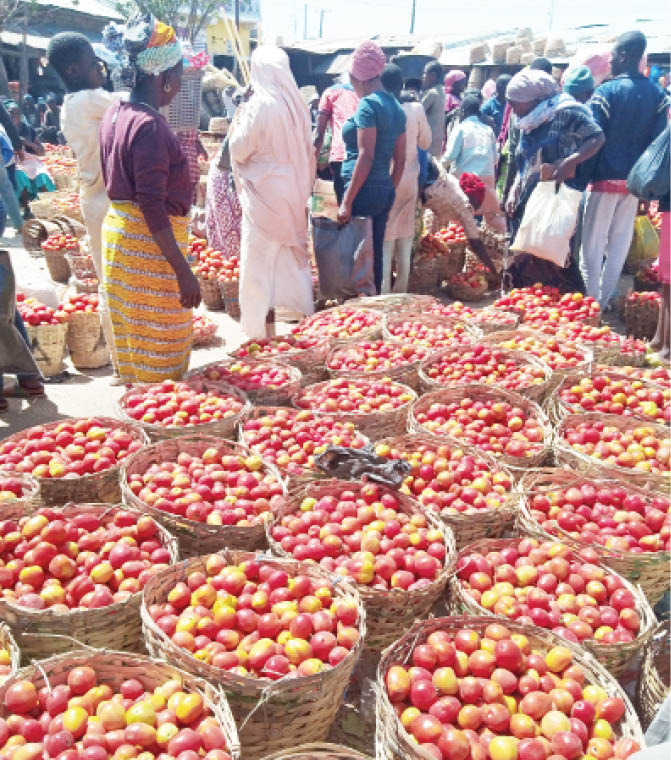Why dried tomato price continues to rise in Katsina
The general decline in the volume of fresh tomatoes produced this year may lead to high demand and a rise in the cost of the dried variety in the forthcoming Ramadan and Sallah periods, Daily Trust reports. According to the dealers, sun-drying of tomatoes was mainly a result of glut; so that farmers and dealers […]

Baskets of tomatoes displayed for sale
The general decline in the volume of fresh tomatoes produced this year may lead to high demand and a rise in the cost of the dried variety in the forthcoming Ramadan and Sallah periods, Daily Trust reports.
According to the dealers, sun-drying of tomatoes was mainly a result of glut; so that farmers and dealers could mitigate the loss in the value of the produce; but which has now become a trend in the value chain of the produce.
Malam Muhammad Kokami, a tomato farmer and dealer, said with the growing population in the country and the high cost of production, tomatoes would hardly lose their value in their production circle, as was the case before.
“Not every farmer can engage in tomato production like before because of the high cost now. Some of us have switched to potato, onion, wheat or cabbage production, and if you go round the irrigation sites you will notice that the volume produced in the last two years has grossly reduced.”
- NDLEA secures 168 years jail terms for 15 drug kingpins in 2023 – Marwa
- Senegal: US, CDD condemn presidential poll shift
Kokami added that the shortage of water in their tube wells and rivers has forced some farmers to abandon their crops mid-way into production this year.
“All these factors, plus our growing population, demand has increased on the limited supply of tomato in the markets hence farmers hardly sun-dry the produce as they can rake their revenue on the fresh ones without any added cost or labour,” Kokami said.
Another tomato dealer, Alhaji Usman Abdu, said farmers sun-dried tomatoes just to mitigate loss during glut, but that the dealers were doing it to maximize profit in future and as a store of value.
“We are quite different from farmers because we are the players in the market and always looking for opportunities to exploit. Since Kano farmers experienced a disease attack on their tomato farms some months back, we envisaged high demand for the produce here at this period and most importantly the dried one in the next few months,” he said.
He added that despite the market value of the fresh ones, they were still sun-drying the produce in order to meet up with the demand in the next few months.
“A crate of fresh tomato is now sold for N5,000 to N6,000, unlike when it was sold at a little over N1,000. Presently a bag of dried tomatoes goes for N45,000 and only God knows where it will reach in the approaching Ramadan and Sallah periods,” said Alhaji Usman Abdu.
He further said they were stockpiling the dried produce to be released to the markets in the months of May, June, and July when irrigation farming has subsided and wet season fresh ones are yet to be in the markets.
On the issue of modern storage and drying facilities, Kabiru Abubakar an agric entrepreneur said there was no genuine commitment from both the government and the private sector, especially as dried tomato has now become a value addition of sorts to tomato production, especially in the North.
“For years, there were promises but none of which came to fruition as it regards modern tomato drier and storage facilities. Take a look at Danja, Dantankari, Tafoki, Kafur and Bakori where tomatoes are yearly being produced in commercial quantities yet there was no intervention in the system of storage and drying to mitigate loss and improve quality,” Kabiru Abubakar said.
He called on the state government to consider intervening in the provision of modern storage and drying facilities just like it provides solar-powered water pump machines to irrigation farmers.
